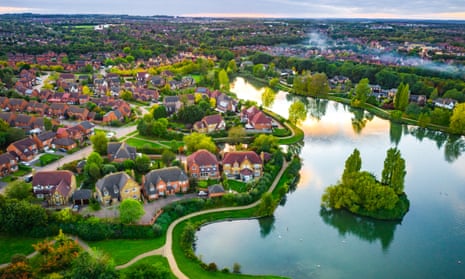On the long train journey back to London from the Labour party conference, crowds of delegates, politicos and journalists will have stopped briefly at Milton Keynes Central. Some may have given a passing thought to this city, given that it could be the blueprint for the next generation of “new towns” that Keir Starmer hopes to build.
For me however, Milton Keynes is more than a fleeting thought – it is the place where I was born and grew up. Next year I hope to represent the constituents of Milton Keynes North as a Labour MP.
Despite the derision they sometimes receive, new towns have clear political appeal. In the face of tight budgets and an ever-growing housing crisis, hundreds of thousands of new properties can be built alongside the vital infrastructure required to serve them. As happened in Milton Keynes, a development corporation is lent money to buy land at agricultural prices, planning permission is granted, and the profit from the eventual sale of the homes is more than enough to cover the cost of building everything else the area needs.
But my love of the city and my passionate support for creating more new towns like it is based on so much more than the economic benefits. A planned town provides a near-blank slate on which something great can be created.
Fred Roche, who managed the Milton Keynes Development Corporation, demanded that his team “make no small plans”. A colleague once described him as a streetfighter who marched into Whitehall and refused to leave until his designs were approved. The story goes that he insisted on constructing the outer roads first so the Treasury couldn’t make cuts later; a tactic I imagine the project managers responsible for HS2 wish they had thought of.
I was fortunate enough to be a member of the first generation to fully reap the rewards of Roche’s determination to prioritise quality of life, freedom and opportunity.
The best-known element of the design is probably the unique grid system. Cars can quickly zip around the city on “H” (horizontal) and “V” (vertical) roads, connected by roundabouts, ensuring that most of the traffic is separated from local communities. The efficiency of the system meant my mum walked through the door from work 20 minutes earlier than she would have done otherwise. It also meant my brother and I never had to cross a busy road, so we could play out without parents fretting. Milton Keynes might be maligned for its roundabouts, but they are precisely what makes it such a good place to live.
And while thousands of new houses were built, this was done alongside protected green spaces, which still (along with its network of lakes, rivers, canals and brooks) make up 40% of the city’s footprint. These green spaces became the football pitches on which I would frustrate my dad by failing to score on a Saturday morning, the waterside walks my brother and I were dragged on to calm us down after overdosing on sugar, and the hills we would sledge down when school was shut for a snow day.
These farsighted developers also found the budget to plant 22m trees – more than 80 for every person, going by today’s population. These became the horse chestnuts where we built dens and hung rope swings. They were the oaks I tried to avoid falling from while racing my friends up their branches. About 100 of those trees were planted by my year-three class, creating a community forest that grew as we grew up alongside it.
The new infrastructure allowed for a wide range of affordable leisure activities, including the many local sports centres, a large indoor shopping centre and the country’s first multiplex cinema. My working-class parents first met learning to sail on one of the city’s many balancing lakes. In a new town such as Milton Keynes, where amenities aren’t just run for a profit, even an activity such as sailing can be open to all and not just a preserve of the well-to-do.
One person who has seen it all is my 91-year-old grandmother, who grew up in the local village of Great Woolstone and experienced the rare sight of a city being built around her. She was in the living room with an old friend of hers when I visited recently. They were recounting gossip from their old village, and can still remember the exact fields where the German planes offloaded their leftover bombs in the 1940s.
Originally, they were strong opponents of building on those fields, fearing the changes it would bring to their tight-knit community. Today, they couldn’t be happier with the freedoms it has given them and the opportunities it has provided to their children and grandchildren: two 1960s nimbys whose firsthand experience has led them to become strong advocates of the new towns project.
They say planting a tree can be one of the greatest acts of altruism. The time spent digging and planting a seed is a small act, but will shape Earth for future generations. Roche, who passed away a couple of years before I was born, certainly planted a few trees in my city. But he did more than that. He built a new town, and that entire project shaped my parents’ lives, shaped my life, and will continue to shape countless others.
His designs meant my young parents could bring me and my brother up in a spacious house with its own back garden. The fulfilled dream of home ownership meant they could provide us with the security and stability needed for the best start in life. The parks created may one day be enjoyed by my own kids.
In a country where it is too easy to find reasons not to build, Roche and his team overcame all obstacles to build something great. As a proud son of Milton Keynes, I can’t think of a more important mission than building more new towns for the generations to come.
Chris Curtis is Labour’s parliamentary candidate for Milton Keynes North

